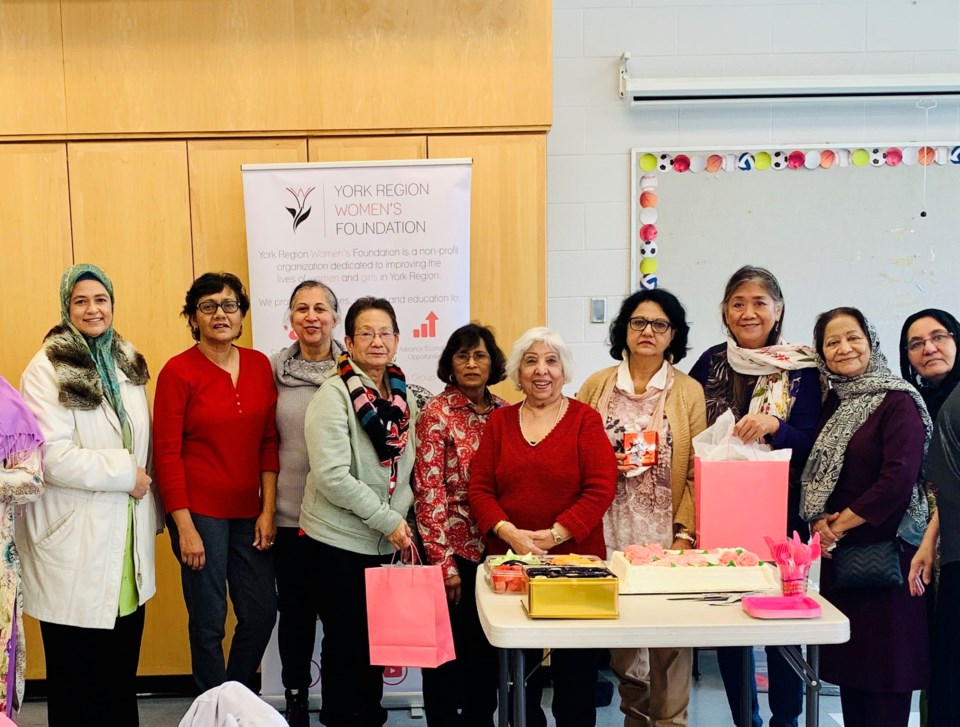Sipra Majumder is one of many seniors that take part in York Region Women's Foundation (YRWF) Art Against Ageism program.
The 80-year-old said she considers herself lucky because she hasn't experienced discrimination due to her age; nevertheless, she wanted to learn more about it.
"I didn't have much knowledge about ageism. I knew it was so widespread I just wanted to know more about it and also I was interested in art."
YRWF is a non-profit organization that offers programs and support to under-represented women in the region. It was one of 237 recipients to receive federal funding through the $100-million Feminist Response and Recovery Fund.
Whether they are marginalized, racialized or new Canadians who don't speak English, the programs are "inclusive to everyone," said co-founder Camille Mohamed.
The foundation offers courses to women of all ages in art, health and fitness, as well as workshops and seminars on topics ranging from economic advancement to elder abuse.
Shahida Khan, 63, wanted to stay physically active after retiring but said she didn't feel comfortable participating at either of the two local community centres.
The other participants, she said, were made up of a single ethnic group and because they spoke in their own language, she just "didn't fit in."
Khan joined yoga for women, a program, according to Mohamed, that's geared to "women who may be reluctant to take part in group physical activities because they may not feel safe or people who don't understand that they have to cover" or any woman who feels more comfortable taking part in female-only activities.
"I enjoyed it so much because it was only for women. I felt more comfortable because growing up back home (in Guyana) we did not really integrate exercise with men. I feel more comfortable with women only than to be sitting with men doing yoga stretches side by side."
Khan said she also enjoyed learning about different cultures through the women she has met in the programs.
During the pandemic, Khan took part in an online program where she learned about the brain activity and mental health of seniors. She received a gift bag of healthy food ingredients and suggestions on how to cook healthfully to improve mental health, as well as a magazine on how to deal with dementia and Alzheimer's.
The course was very informative, Khan said, because there is a history of dementia in her family.
YRWF was founded in 2016 by four culturally diverse second-generation Canadians in York Region who didn't feel that their needs were being met by existing community programs.
"They lacked cultural sensitivity, didn't understand our backgrounds," said Mohamed.
The co-founders spoke to women in the community and learned that many others felt the same way — isolated because of a language barrier or unable to find an organization with more diversity.
YRWF staff speak a variety of languages and their diverse backgrounds are reflective of the women who take the classes and workshops.
A workshop in cosmetology allows women who have overcome trafficking to learn a skill so they can "empower themselves and become more independent" which, in turn, enables them to move on to the next phase of their lives, said Mohamed.
Cooking workshops teach women how to prepare healthy meals that incorporate their own ethnic ingredients something, Mohamed said, that's not done in other cooking courses.
"Recipes don't often consider the cultural component."
According to YRWF, a language barrier can contribute to feelings of anxiety and isolation among non English-speaking new Canadians and immigrants and every-day tasks can become overwhelming. To help women with these obstacles the foundations provides interpreter companions to help women when they need to interact with medical and legal professionals, teachers and others.
Since the pandemic began the foundation's programs have been offered online only. The foundation, which generally operates in southern York Region, recently conducted a survey to find out what type of programs women were interested in.
Many of the respondents were from Newmarket, Aurora and other northern York Region areas, said Mohamed.
Due to the success of the online programs and the fact that so many responses were received from outside southern York Region, the foundation has plans to continue offering programs online to ensure that they are accessible to women throughout York Region.



